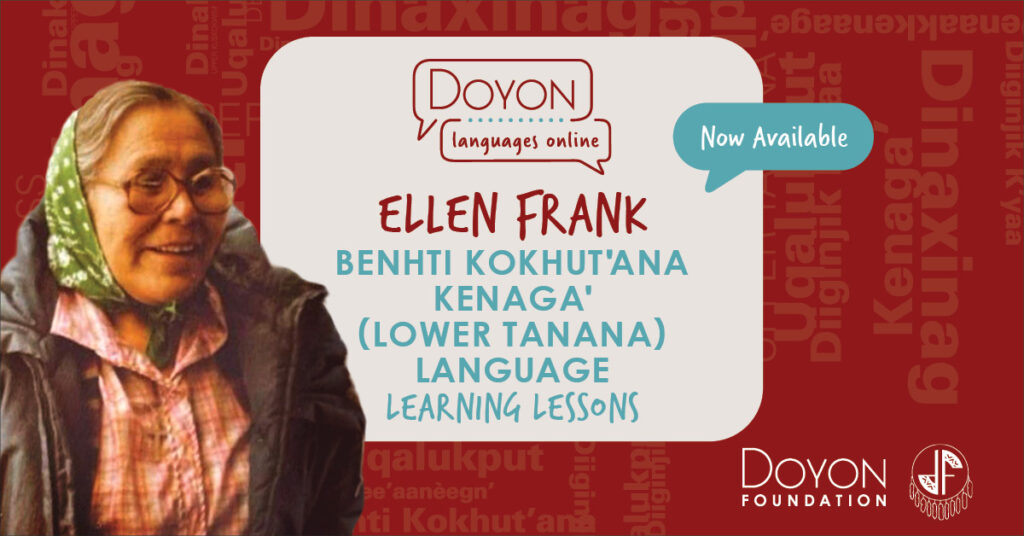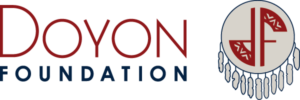
The language work of the late Ellen Frank lives on through a new Doyon Languages Online course featuring her lessons in Benhti Kokhut’ana Kenaga’ (Lower Tanana). The lessons were originally published in 1998 with support from the Alaska Native Language Center at the University of Alaska Fairbanks and the Yukon Native Language Centre in Whitehorse, Yukon.
Ana Basi’ to the family of Ellen Frank for their permission to share her lessons through Doyon Languages Online.
These Lower Tanana lessons are the latest offerings of Doyon Languages Online, a project to increase the number of people who can speak the endangered Native languages of the Doyon region. Lessons are available for free to all interested learners, who can sign up at doyonfoundation.com/dlo.
About the Course
The online Lower Tanana language lessons by Ellen Frank are the result of a partnership between Doyon Foundation, Transparent Language and the nonprofit 7000 Languages.
These lessons are arranged in a seasonal activity format, September through June, but learners encouraged to access the material they are most interested in, rather than follow a strict order.
Ellen’s family hopes that these lessons will be enjoyed by all those interested in learning to speak and understand the ancestral language of the Lower Tanana people of Minto, Alaska.
About the Language
Benhti Kokhut’ana Kenaga’ (Lower Tanana), also known as the Minto-Nenana dialect of Tanana or Lower Tanana, is one of a number of Dene Athabascan languages and dialects spoken along the lower Tanana River. Benhti, Toghotthele, Ch’eno’ and Salchaket are all members of this group of languages of the Tanana Valley, historically spoken from the mouth of the Cosna River (K’osno) in the west to Moose Creek in the east. Benhti means “Among the lakes,” Kokhut’ana means “people of…,” and Kenaga’ refers to the language.
About the Author
Ellen Frank was born July 7, 1922, at Gather Up Camp on the Minto Flats to John Reese and Susie William-Reese. She grew up on the Minto Flats and lived a subsistence lifestyle, moving with the seasons – from trapline camp to spring camp, where she would hunt muskrats. Every summer, she went to fish camp.
She married her husband, the late Arthur Frank, in Nenana, and together they had 17 children. She enjoyed fishing, snaring rabbits, hunting, sewing and making birch bark baskets. One of Ellen’s greatest joys was being around her grandchildren. She would often sing them Indian songs just to see them dance for her.
Ellen was a cultural and bilingual teacher. She worked at the University of Alaska Fairbanks to help document and teach the Minto language. She also taught students at Minto School, sharing with them Native values and traditions.
She passed away on December 22, 2009.
Ana Basi’, Thank You
Doyon Foundation would like to say Ana Basi’ to John Ritter, the Alaska Native Language Center, the Yukon Native Language Centre, Transparent Language, 7000 Languages and Doyon, Limited.
We also extend gratitude to Ellen and all of our Elders, past and present, for teaching us our language and culture.
This online course was funded by the U.S. Department of Education, Alaska Native Educational Program, award # S356A220042.
About 7000 Languages
7000 Languages empowers communities around the world to teach, learn and sustain their endangered languages. They are a 501(c)(3) public charity whose vision is one where all communities have the resources and opportunities to reclaim, strengthen and revitalize their languages.
About Doyon Languages Online
Doyon Foundation and our partners continue to expand the number of courses available through Doyon Languages Online. Current course offerings include:
• Benhti Kokhut’ana Kenaga’ (Lower Tanana) (Doyon Languages Online course, plus online course based on the work of Ellen Frank)
• Deg Xinag
• Denaakk’e (Koyukon)
• Dihthaad Xt’een Iin Aanděeg’ (Tanacross) (Doyon Languages Online course, plus online course based on the work of Irene Solomon Arnold)
• Dinak’i (Upper Kuskokwim)
• Dinjii Zhuh K’yaa (Gwich’in)
• Doogh Qinag (Holikachuk)
• Hän (Doyon Languages Online course, plus special memorial course based on the work of the late Isaac Juneby)
• Nee’aanèegn’ (Upper Tanana) (Doyon Languages Online course, plus online course based on the work of Avis Sam)
Doyon Languages Online courses are available for free to all interested learners. Students can sign up and access the courses from a desktop or laptop computer, or via the Transparent Language app available for both Apple and Android mobile devices and tablets.
For more information on the Doyon Languages Online, please visit doyonfoundation.com/dlo or contact 907.459.2048 or foundation@doyon.com. For assistance signing up for or using Doyon Languages Online, view the instructional video series on YouTube.
